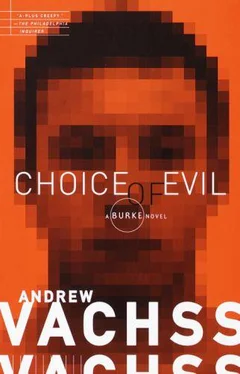Strega led me to a back bedroom. It was dark. I saw Nadine, sitting on a straight chair in a corner, facing out. Her legs were pressed primly together, hands in her lap.
“Come on,” I told her. “We’re going.”
She got up and came with me.
“I want to talk to you,” she said as I turned onto Metropolitan Avenue, heading straight down to the Williamsburg Bridge, no traffic at that hour, a clean run.
“Talk,” I told her.
“You know what she did?”
“Who?”
“Strega. She told me her real name. With me. Back in that room.”
“I don’t have a clue. Nothing she did would surprise me.”
“She told me to sit down. In that chair. I did it. Then she slapped my face. Not. . . playing, like we do. But to. . . get my attention. So I’d listen. I could tell. She has a voice like a snake. It scared me. But only a little. She said if I did anything to hurt you she’d make me dead. Slow dead. Rotting from the inside. She said she was a witch. And she told me something about myself to prove it.”
“Which was. . .?”
“I don’t have to tell you,” she said, in a little girl’s adamant voice. “She said I didn’t have to tell you. But she knew. Nobody knows, but she knew. She said I could have my secret. Everybody has secrets. But not from her. She said you were in her. Inside her. Not like sex. . . I don’t know what she meant, but I know she meant it.”
“So she guessed something about your past and you—”
“She wasn’t guessing. And it doesn’t matter. I wasn’t going to hurt you anyway. But I have to see him. Even if it. . . Whatever happens, I have to see him. You promised. You said if I—”
“I’m keeping my promises,” I told her. “To everyone. But I can’t make things happen. All I can do is try to make them happen, understand?”
“Yes. I know. I’m sorry if I—”
“It doesn’t matter now,” I told her.
I pulled up outside her apartment building. “Where’s your mask?” I asked her, looking in the back seat.
“It’s hers now,” Nadine said. “She told me to give it to her. Are you going to call me when—”
“Yes,” I lied.
I had the Plymouth in motion the second she slammed the door.
I thumbed the cellular into life, tapped out Mama’s number. I don’t use speed-dial—cloning cell-phone numbers is a big-time felony, and if this one fell into the wrong hands, I wouldn’t want anything that could connect back to me. I never even touch the damn thing without gloves on.
“Gardens,” Mama answered.
“Anything?”
“Yes. Girl call. Say, more come in, okay?”
“Got it,” I told her, and aimed the Plymouth in the right direction.
“He sent another,” Xyla said, excitement clear in her voice. “Same as last time. You want to look at it, right?”
“Yeah.”
“Okay. You remember how to do it?” she asked, getting up from her chair.
“I do. Thanks.”
I lit a cigarette and pulled the curtains aside. There he was:
This is my ninth experience. Of the prior eight, I collected the ransom in five. I consider this to be a laudatory record of success. Perhaps I could have increased the collection percentage, but at the cost of increasing risk. My way is unalterable, however—unless and until each and every step is flawlessly executed, in sequence, with the proper response from the target, I simply retire from the field.
The first step, obviously, is research. How many kidnappings have failed when it develops that the parents simply lack the appropriate resources? To demand a half-million-dollar ransom from a man whose net worth is in five figures is the act of a fool. A doomed fool.
As I write this, I realize the value of the writing. It clarifies my own thoughts. And helps me to express them to you. . . the eventual reader. Thus, in reviewing the last paragraph, I came to realize that I have omitted a vital step. One that comes before research. Indeed, before anything. It is, doubtless, one of the many aspects of my modus operandi that distinguishes me from other operators. What is this critical distinction, you might ask? The answer is: A trial run. Not with the intended victim, but with the entire process.
Thus I began my kidnapping career by deconstructing the totality into segments, then practicing the various aspects independently so as to avoid even the possibility of detection. So, for example, I might research Family “A” as to finances, but conduct surveillance of Family “B” as to terrain and so on. In point of fact—verified by the records, which are appended hereto—I captured four separate children successfully before I ever sought ransom of any kind. Each technique was perfected before moving on to the next.
I scrolled down fast, looking for the records he was talking about, but all I got was:
Forgive the rambling. I realize it is a conceit to assume that the (future) reader will be as fascinated with my thought processes as I myself am, but not all conceits are axiomatically invalid. Again, it is a matter of risk versus gain. If you are interested, then I must include everything or you will be cheated. If you are not, what has been lost?
Research is only a small portion of my success. Another operative factor is clinical purity. That is, no secondary motive. Too many kidnappers are, in fact, perverts or degenerates. Sadists, child molesters, rapists. . . those of that odious breed. The ransom demand is mere protective coloration over their actual intent—the true force which drives them.
I have no such demons within me. I take only children because: (a) they are more gullible; (b) they are less capable of physical resistance; (c) they are more likely to be ransomed, if only because the dictates of society so require.
The children are never returned. No matter how careful the kidnapper, some risk is always inherent in returning a victim. And while children are, in fact, weaker and easier to gull than adults, their powers of observation are extraordinary, their memories excellent, and their post-traumatic revelations have convicted more than one perpetrator.
I never kill with force. Not one child yet has refused the food I offered. Death follows, painlessly. The bodies are never found. No, not out of some sadistic desire to deny the parents the “closure” so beloved of the self-aggrandizing, but from the knowledge that forensics is a weapon I must deflect to the fullest extent possible.
Often, the children must be kept alive for some protracted period of negotiations, that complex dance in which the parents attempt to avoid the inevitable and the police interfere regardless of my instructions. In fact, at this point in my career, I *expect* police intervention. A routine, predictable annoyance.
Which is undoubtedly what led me to my most recent decision. . . to kidnap the child of an organized-crime kingpin. Viewed logically, it squares fully with my own precepts. The target: (a) has the necessary cash resources; (b) believes his child to be exempt from attack because of some archaic “code” allegedly governing conduct between gangsters; and (c) will not notify the authorities.
If this works as anticipated, I may sub-specialize in this area for the foreseeable future.
As soon as the screen started to change color, I knew what was coming. I hardly got her name out of my mouth before Xyla came bounding into the room, dropping into the chair I had just vacated with the springy grace of a gymnast. His message came in seconds:
>>Your prior proof acknowledged. Further transmissions from me on pure exchange basis. Next installment available only upon revelation of Wesley work not known to law enforcement. Maximum length = 5 words. Send *now*.<<
I stepped behind Xyla, put my hand on her shoulder. “Five words maximum? I’ll go the son of a bitch a couple better,” I told her. “Type this”:
Читать дальше











